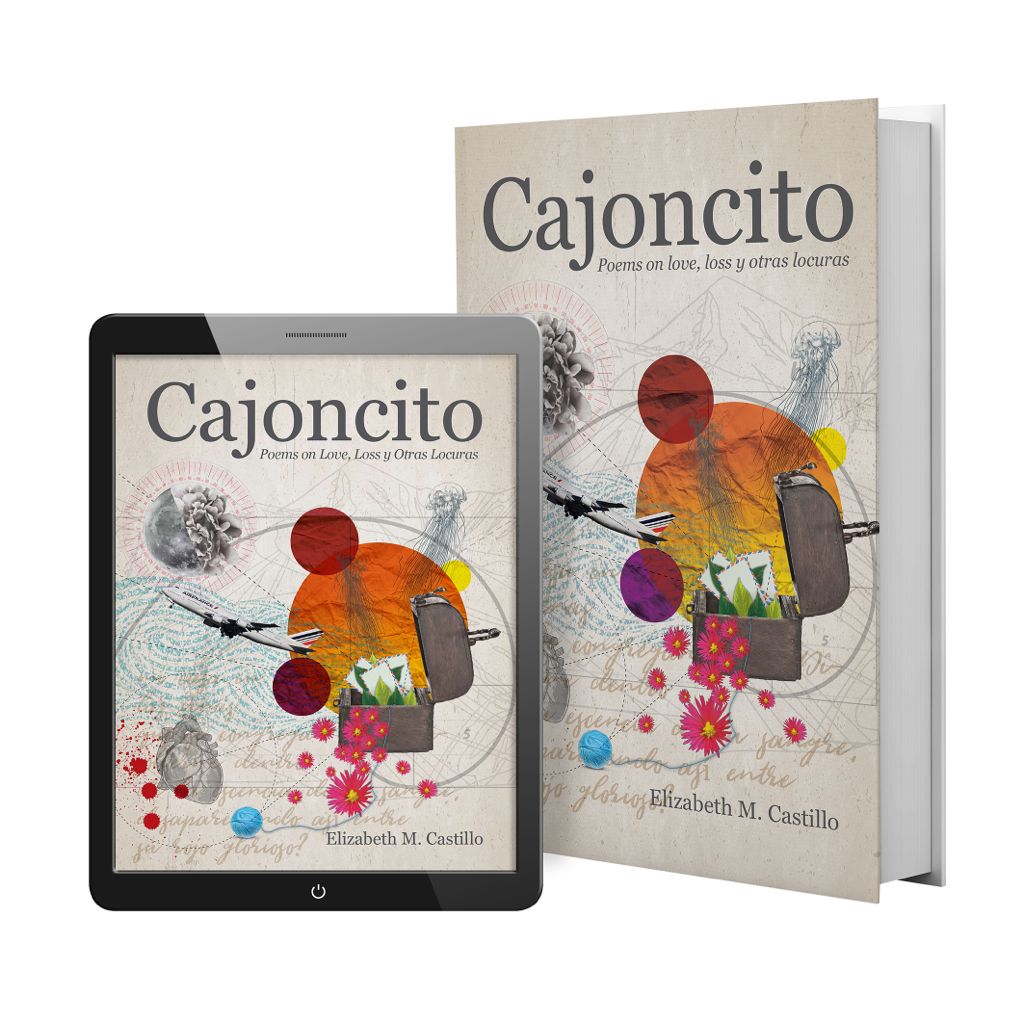|
Elizabeth M Castillo is a British-Mauritian poet, writer, indie-press promoter. She lives in Paris with her family and two cats, where she writes a variety of different things under a variety of pen names. In her writing Elizabeth explores themes of race & ethnicity, motherhood, womanhood, language, love, loss and grief, and a touch of magical realism. She has words in, or upcoming in Selcouth Station Press, Pollux Journal, Revista Purgante, Feral Poetry, Streetcake Magazine, Fevers of the Mind Press, Bandit Fiction, Epoch Press, among others. Her bilingual, debut collection “Cajoncito: Poems on Love, Loss, y Otras Locuras” is available for preorder from her website/available on Amazon. You can connect with her on Twitter and IG at @EMCWritesPoetry.
Q: Your collection deals with a lot – loss, regret, heartbreak, love, resilience and so much more. Did you find it easy to write about these subjects? Are there any subjects you find too difficult to write about? It does, doesn’t it? I was afraid that there would be too much of the same thing when putting the poems together, but coming back to it I realise that “Cajoncito” covers more ground than I originally thought— and not just because the poems jump from the Congo river to the Andes to Paris via Mauritius and back again! More than easy, I found it necessary to write about these things— most of these poems were sort sitting at the tip of my tongue, so-to-speak. The vast majority of them just fell out of me, and ended up going through very little editing. Some of the poems I edited for weeks only to bring them back to where they were to begin with! That was the original idea behind the title of the collection: “Cajoncito” is the spanish word for “little drawer,” and these poems were about experiences and emotions that needed to be acknowledged and felt, before packing them away somewhere for safekeeping, and cracking on with life. Strangely enough I do find writing about Mauritius, the country I grew up in, very difficult, though if you were to look at my life you wouldn’t guess living there had been a traumatic experience. Interestingly, now that Cajoncito is finished, I'm slowly working on a collection of pieces (some experimental!) about Mauritius and my relationship with the concept of “home.” Other than that, every subject is fair game. And I always hope that when writing about grief, miscarriage, depression or otherwise, perhaps someone who is also suffering can find comfort or company in my words. Q: In your collection, you have a translation of each piece. How important is it for you to write in different language, or a mixture of languages? How do you decide which language to use or does it happen naturally when you sit down to write? It might sound cheesy but the muse totally decides! Spanish is my fourth language, so it was as much as surprise to me as anyone the first time an entire poem came out of me in Spanish (it was De Repente/Suddenly if anyone is interested…) Some pieces appear entirely in one language, others will, like me, call on a word or phrase in another language simply because I just can’t remember it in English. Anyone who knows me in person knows I jump from language to language when speaking, so I also think it’s only natural these poems— that are so personal and so very close to me— reflect that aspect of my voice. Q: Your collection is self-published. Can you tell us a bit about this process and how you found it? Which parts were easy/difficult? I chose to self-publish for two reasons. The first being that I had a very clear vision for this collection- what I wanted to do with it, how I wanted it to look, how far I wanted it to reach. But also because I doubted I would find a publisher that would agree to leave my little Cajoncito as I imagined it— who would embrace the multiple languages, themes and references. I actually did submit the manuscript to about 5 publishing houses and presses. Two declined, one never got back to me, and another expressed interest but wanted less Spanish as they felt it might “alienate” readers. This was before I decided to translate all the poems in the collection. At that point Spanish poems made up about 30% of the collection. In the end I withdrew my submission from the last press, and decided to take the leap and self-publish. It was also following a conversation with another traditionally published poet where she told me that X amount of book sales was considered a successful run in independent press circles. I remember thinking to myself “I reckon I can sell that many!” Self-publishing in itself is easy enough- there are so many platforms and companies to choose from. And if you have some money to invest, blog tours and other promo can also be arranged. The most challenging aspect for me is getting word out there about the book. I live in Paris, and my book is in English and Spanish, so I don’t have much by way of local audience for my work. Local poetry readings are few and far between, and almost entirely in French. None of my friends or family are particularly literary, or even read poetry, so I’m completely reliant on social media connections and writing friends across the world. Luckily I’ve managed to build quite a solid network, and my books will be for sale in some independent book stores in Mexico, Spain and hopefully the UK. What I didn’t expect is to feel so burned out by the whole process. It’s a lot to be your own editor, publisher, agent, publicist, graphic designer and social media manager. And all of this part-time as, like most of us writing mothers, I have a household to run, children to homeschool, and an actual job to do in order to put food on the table. I was really looking forward to promoting my book once it was ready for preorder, I had 145376761 ideas, but sometimes it feels as though I’ve poured so much into the book so far, I don’t have much left to give anymore! Q: What’s your least favourite part of the writing process? I can’t stand the admin! I love connecting with new people on social media, but learning to bend the algorithms and be strategic with posting is exhausting. I love supporting indie literary publications, but the submissions process is so draining! I wish I could write my poems and throw them out the window and they could make their way to the readers... Q: What advice would you give a new writer? Just sit down and write the thing. A terrible first draft is better than no draft. Read in the genre you want to write. Oh, and be kind, the industry (and the world) needs more of that. Q: Where can we find out more about you and/or your collection? You can connect with me on Twitter or Instagram as @EMCWritesPoetry, on Facebook as Elizabeth M. Castillo, email me at [email protected], or sign up to my mailing list www.elizabethmcastillo.com. My collection is available for preorder/sale in both paperback and EBook/PDF from my website www.elizabethmcastillo.com/coming-soon
0 Comments
|
Short reviews of books I've enjoyed and author interviews Archives
January 2022
Categories |
Member of the Society of Authors
Copyright © 2019 onwards · All Rights Reserved · Nikki Dudley
Proudly powered by Weebly


 RSS Feed
RSS Feed